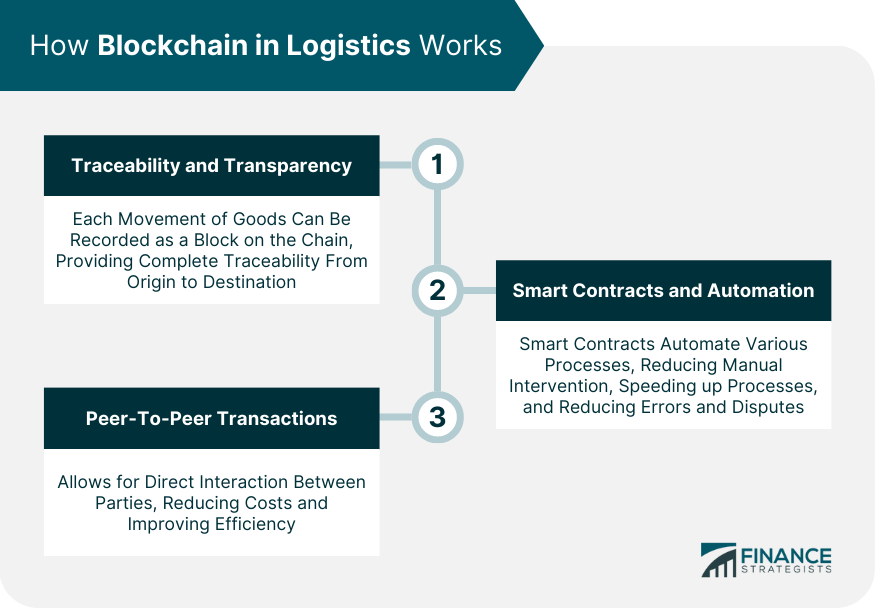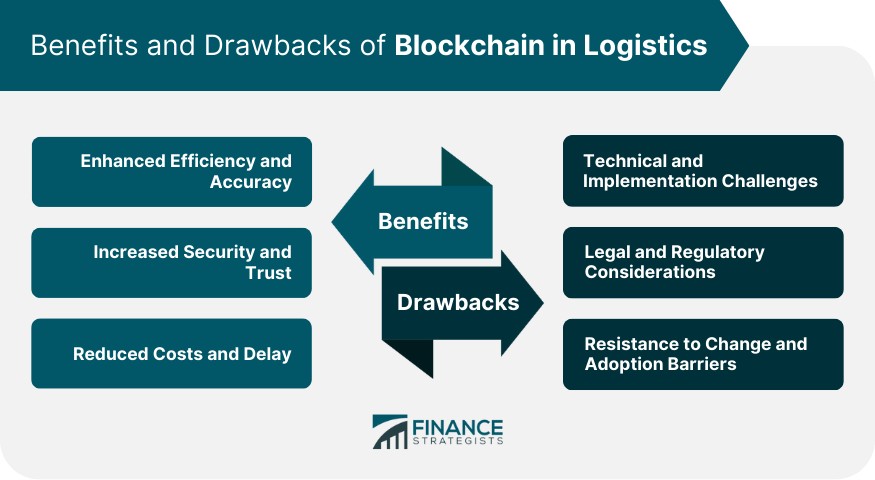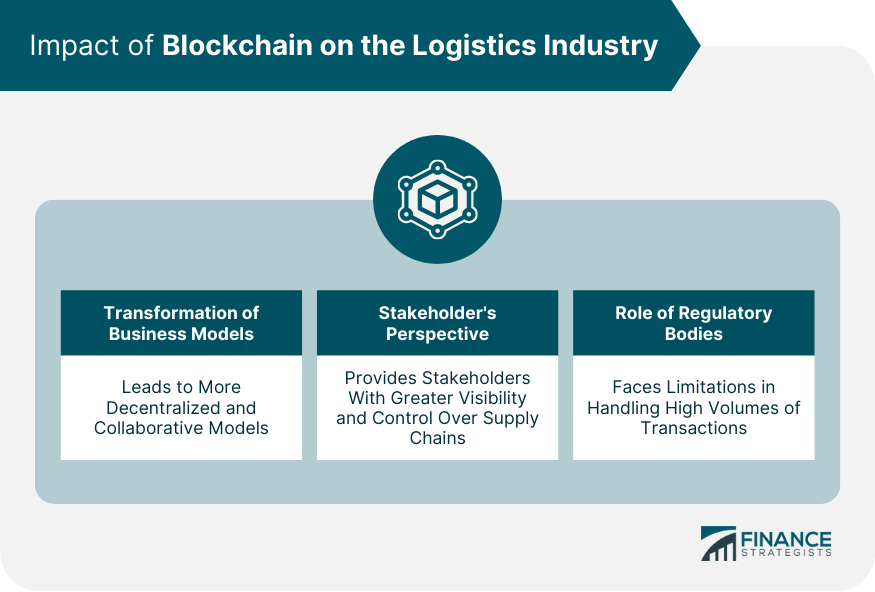Blockchain in logistics refers to the application of blockchain technology to improve efficiency, transparency, and security in supply chain operations. Blockchain, a decentralized and immutable digital ledger system, captures every transaction in a verifiable and permanent way. In logistics, each movement of goods from origin to destination can be documented as a block on the chain, offering complete traceability. This allows all stakeholders, from manufacturers to consumers, to have a single source of truth. Additionally, blockchain technology can automate various processes through smart contracts, thereby reducing manual errors and disputes. Although still emerging, blockchain in logistics holds promising potential to transform the industry, making supply chains more efficient, secure, and resilient. The logistics industry is complex, involving multiple stakeholders, including manufacturers, distributors, retailers, and consumers. Each transaction, from the movement of goods from production to end-consumer, involves layers of paperwork, coordination, and trust. The purpose of blockchain in logistics is to streamline these processes, reduce paperwork, and increase trust and transparency among stakeholders. The importance lies in its potential to transform logistics, making supply chains more efficient, secure, and resilient. Blockchain provides an immutable record of transactions. Each movement of goods can be recorded as a block on the chain, providing complete traceability from origin to destination. This transparency helps reduce fraud and counterfeiting, as each product can be traced back to its source. Smart contracts are self-executing contracts encoded on the blockchain. In logistics, they can automate various processes, such as payments and confirmations, based on predefined conditions. This reduces manual intervention, speeds up processes, and reduces errors and disputes. Blockchain eliminates the need for intermediaries by enabling peer-to-peer transactions. This allows for direct interaction between parties, reducing costs, and improving efficiency. By automating processes and providing a single source of truth, blockchain reduces errors and improves efficiency. It speeds up processes by eliminating the need for manual paperwork and reconciliation, resulting in quicker deliveries and satisfied customers. Blockchain’s immutable and transparent nature increases trust among stakeholders. It helps prevent fraud and counterfeiting, leading to more secure supply chains. The use of smart contracts also ensures that terms are automatically enforced, further increasing trust. Blockchain can reduce costs in the logistics industry by eliminating intermediaries, automating processes, and reducing fraud. It can also reduce delays caused by paperwork and disputes, leading to more efficient and reliable supply chains. Implementing blockchain in logistics involves technical challenges. It requires integrating blockchain technology with existing IT systems, which can be complex and costly. Also, as blockchain is still a relatively new technology, there may be a lack of technical expertise in the field. The use of blockchain in logistics may raise legal and regulatory issues. For example, it may not be clear which jurisdiction’s laws apply to a blockchain transaction. Furthermore, regulations regarding blockchain are still evolving, creating uncertainty. Adopting blockchain requires a significant change in processes and systems, which may meet resistance from employees and stakeholders. There may also be skepticism about the benefits of blockchain, and concerns about issues such as data privacy could hinder adoption. Blockchain could transform business models in the logistics industry. It could lead to more decentralized and collaborative models, where all parties in the supply chain share a single, transparent view of transactions. This could change the role of intermediaries and impact traditional logistics roles. From a stakeholder's perspective, blockchain could provide greater visibility and control over supply chains. Consumers could trace the origin of products, suppliers could track payments, and regulators could monitor compliance more effectively. Regulatory bodies could play a key role in the adoption of blockchain in logistics. They could provide a legal framework for blockchain transactions, address regulatory uncertainties, and promote best practices. They could also use blockchain themselves to improve regulatory compliance and enforcement. The application of blockchain in logistics offers promising potential to revolutionize the logistics industry. It has the potential to bring about enhanced efficiency, increased security, and reduced costs. However, challenges remain, including technical hurdles, legal uncertainties, and resistance to change. The future success of blockchain in logistics will likely depend on overcoming these challenges, fostering collaboration among stakeholders, and creating a supportive regulatory environment. Despite the obstacles, the transformative potential of blockchain could reshape the logistics industry, making supply chains more transparent, efficient, and resilient.What Is Blockchain in Logistics?
Purpose and Importance
How Blockchain in Logistics Works
Traceability and Transparency
Smart Contracts and Automation
Peer-To-Peer Transactions

Benefits of Blockchain in Logistics
Enhanced Efficiency and Accuracy
Increased Security and Trust
Reduced Costs and Delays
Drawbacks of Blockchain in Logistics
Technical and Implementation Challenges
Legal and Regulatory Considerations
Resistance to Change and Adoption Barriers

Impact of Blockchain on the Logistics Industry
Transformation of Business Models
Stakeholder's Perspective
Role of Regulatory Bodies

Conclusion
Blockchain in Logistics FAQs
Blockchain in logistics refers to the use of blockchain technology in the logistics industry to enhance transparency, traceability, and efficiency in supply chains. It streamlines processes, reduces paperwork, and increases trust among all involved parties.
Blockchain records each transaction as a block on the chain, providing complete traceability of goods from origin to destination. This transparency helps reduce fraud and counterfeiting, as every product can be traced back to its source.
Blockchain in logistics can enhance efficiency and accuracy by reducing errors and automating processes. It can also increase security and trust due to its immutable and transparent nature. Additionally, it can help reduce costs and delays by eliminating intermediaries, automating processes, and reducing fraud.
Challenges include technical and implementation issues, such as integrating blockchain with existing IT systems. Legal and regulatory issues could also arise, as regulations surrounding blockchain use are still evolving. Furthermore, resistance to change and concerns about data privacy could act as adoption barriers.
Blockchain can lead to more decentralized and collaborative business models, where all parties in the supply chain share a transparent view of transactions. From a stakeholder's perspective, it could provide greater control over supply chains. Regulatory bodies could also use blockchain to improve compliance and enforcement.
True Tamplin is a published author, public speaker, CEO of UpDigital, and founder of Finance Strategists.
True is a Certified Educator in Personal Finance (CEPF®), author of The Handy Financial Ratios Guide, a member of the Society for Advancing Business Editing and Writing, contributes to his financial education site, Finance Strategists, and has spoken to various financial communities such as the CFA Institute, as well as university students like his Alma mater, Biola University, where he received a bachelor of science in business and data analytics.
To learn more about True, visit his personal website or view his author profiles on Amazon, Nasdaq and Forbes.











